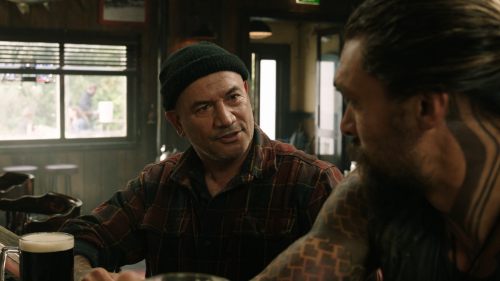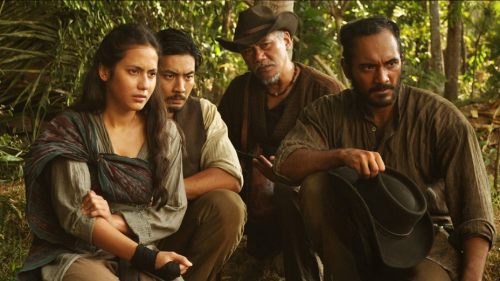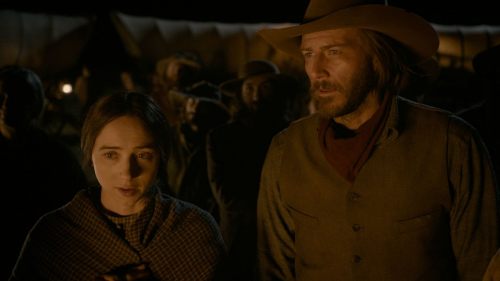UTU: Colonialism and Revenge In New Zealand’s Wild West
Every country that's ever been colonised has had a Wild West period. The colonists' influence spreads, frontiers move, laws bend, and indigenous wildlife, people, and cultures are pushed back. It was true of the Americas; it was (and still is) true of Australia; it was true of Africa and South Asia. But it is to New Zealand that we turn to examine the 1983 film Utu, my favourite movie from my own country and a brilliant recontextualisation of the Western.
New Zealand’s landscapes have stood in for America in multiple Westerns, most recently in last year’s Slow West. But Utu is set in actual New Zealand, putting a Western hat on a period in the country’s history that is often wilfully ignored. The New Zealand Wars were a thirty-year period of conflict that took place in the mid-1800s, claiming the lives of hundreds of occupying British and thousands of native Maori. They sprung from a series of British land grabs, including the Treaty of Waitangi, the notoriously problematic document upon which the colony of New Zealand was founded (and which is still debated vigorously today).
One of the final episodes in the New Zealand Wars - the episode from which Utu takes its inspiration - was Te Kooti’s War. Te Kooti was among hundreds of Maori imprisoned without trial (an imprisonment since judged illegal) who escaped captivity and led a four year guerilla war of utu against the British. The Maori concept of “utu” is one of reciprocation. That can take the form of something as simple as returning a favour, but often “utu” is used to refer to revenge. In Utu, whose title appears wreathed in flame, it’s definitely revenge.
Utu does not shy away from showing the Maori people colonised both culturally and militarily. If they’re not herded into a church to be preached at by a fire-and-brimstone clergyman, they’re gunned down in their villages. The British forces in the film range from the pompous, douchebaggy ruling class to younger, native New Zealanders who don’t seem to fully believe what they’re fighting for. It’s a damning depiction of the British influence on the country, and one not far divorced from similarly revisionist Westerns set in North America. In the face of this kind of treatment, violent retribution seems justified - as its main character says, “The pakeha [white people] have taught us many things.”
The fictionalised story of Utu follows multiple characters as racial, military, and colonial tensions reach boiling point. Te Wheke (Anzac Wallace), a Maori captain in the British army, has the most potent story: discovering that his own troops have massacred his family’s village, he deserts and commences wreaking revenge through guerilla attacks on the occupying force of white men. Despite having barely any prior acting experience, Wallace delivers a dynamite performance of a complex character, at once righteous and terrifying, solemn and drily witty.
Revenge takes another turn with Kiwi acting legend Bruno Lawrence’s Williamson, whose home is destroyed, and wife killed, by Te Wheke’s forces. Lawrence is characteristically unhinged in the role as he “goes bush,” constructs improvised weaponry (including a seriously badass quad-barrelled shotgun with a piano pedal as a trigger), and hounds Te Wheke at every turn. But by the end of the film, Williamson isn’t the only character with a personal grudge against another, as the web of revenge grows ever more complex.
The cliche of New Zealand films is that they are dark, depressing, and dispiriting. While Utu’s subject matter is certainly dark, it’s anything but depressing - it wraps its historical fiction in a rollicking action-adventure package, with memorable characters and a surprising amount of laughs. Geoff Murphy - hot off New Zealand’s then biggest hit Goodbye Pork Pie, later to make post-apocalyptic classic The Quiet Earth before being wasted on the likes of Under Siege 2 and Lord of the Rings’ second unit - directs an energetic, muscular romp, infused with spaghetti Western action, ‘70s counterculture, and New Zealand history. Like many Westerns, Utu is also extremely violent. Characters are hanged, shot to death, decapitated, blown up, and impaled, the body count rising high over its 105 minutes. And get this: the Redux version is actually shorter than the original, thanks to snappier editing.
Utu was not just a hyper-entertaining escalation of New Zealand’s burgeoning cinematic culture. It was a bullet through the heart of a notion the country held (and still holds) dear: that New Zealand is a model of how to successfully integrate two disparate cultures together. The way many people, and especially politicians, would have it understood, New Zealand’s race problem was solved over a century ago. As the '80s rolled in, and with it a more cynical generation, Utu played a role in dispelling that myth.
New Zealand theoretically celebrates the signing of the Treaty of Waitangi every February, but the Treaty’s repercussions are still felt today. Just like anywhere else colonised by white folks, the indigenous people of New Zealand continue to suffer from repression, whether active (as in the film) or passive (as has emerged systemically over the centuries). Utu tore open that wound in cinemas across the country, presenting a complicated story where motivations are far from black and white. The movie doesn’t provide any simple answers, nor should it - there is no easy solution to this kind of conflict.
Utu’s suspenseful final scene, an impromptu court-martial taking place around a campfire, highlights the hypocrisy of colonial law and disputes the very notion of justice. Upon Te Wheke’s sentencing, a traffic jam of people from both “sides” line up to execute him, all with good reason; Te Wheke retorts that British justice has no meaning in New Zealand. In this grim scene, everyone is guilty and everyone has violence in their hearts. Each act of revenge creates a new cycle of violence and resentment, says Maori soldier Wiremu, and he might as well be speaking directly to the film’s audience. We may never escape it.
Just like other films have done in North America, Utu exploits the Western genre’s frontiersmanship, brutality, and nihilism to highlight the destruction of one culture by another. It’s New Zealand’s best film ever, at once culturally significant and broadly entertaining, melding American genre with New Zealand history to stunning effect. American viewers will likely find it hard to find (tip: import the Redux version on Blu-Ray), but hot damn, it’s a great watch if you can track it down.



